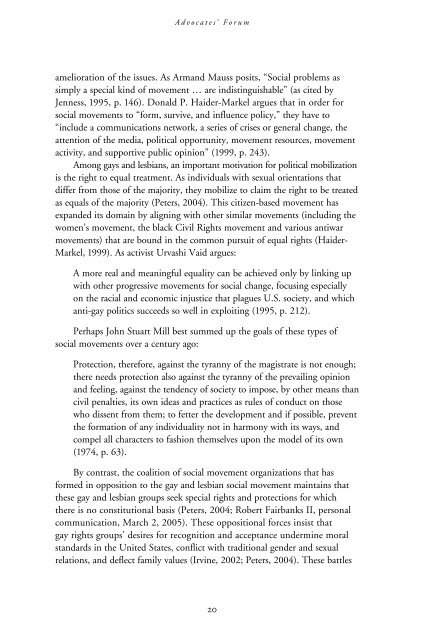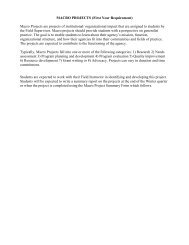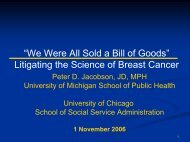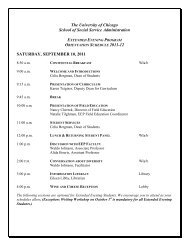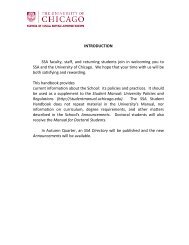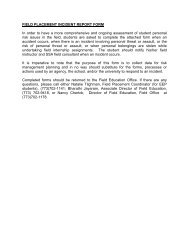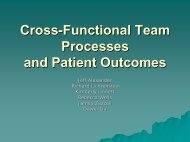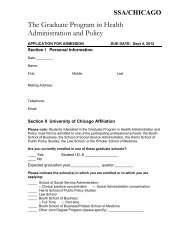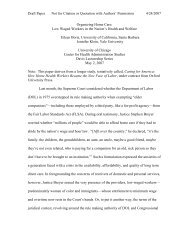2006 - School of Social Service Administration - University of Chicago
2006 - School of Social Service Administration - University of Chicago
2006 - School of Social Service Administration - University of Chicago
Create successful ePaper yourself
Turn your PDF publications into a flip-book with our unique Google optimized e-Paper software.
Advocates’ Forum<br />
amelioration <strong>of</strong> the issues. As Armand Mauss posits, “<strong>Social</strong> problems as<br />
simply a special kind <strong>of</strong> movement … are indistinguishable” (as cited by<br />
Jenness, 1995, p. 146). Donald P. Haider-Markel argues that in order for<br />
social movements to “form, survive, and influence policy,” they have to<br />
“include a communications network, a series <strong>of</strong> crises or general change, the<br />
attention <strong>of</strong> the media, political opportunity, movement resources, movement<br />
activity, and supportive public opinion” (1999, p. 243).<br />
Among gays and lesbians, an important motivation for political mobilization<br />
is the right to equal treatment. As individuals with sexual orientations that<br />
differ from those <strong>of</strong> the majority, they mobilize to claim the right to be treated<br />
as equals <strong>of</strong> the majority (Peters, 2004). This citizen-based movement has<br />
expanded its domain by aligning with other similar movements (including the<br />
women’s movement, the black Civil Rights movement and various antiwar<br />
movements) that are bound in the common pursuit <strong>of</strong> equal rights (Haider-<br />
Markel, 1999). As activist Urvashi Vaid argues:<br />
A more real and meaningful equality can be achieved only by linking up<br />
with other progressive movements for social change, focusing especially<br />
on the racial and economic injustice that plagues U.S. society, and which<br />
anti-gay politics succeeds so well in exploiting (1995, p. 212).<br />
Perhaps John Stuart Mill best summed up the goals <strong>of</strong> these types <strong>of</strong><br />
social movements over a century ago:<br />
Protection, therefore, against the tyranny <strong>of</strong> the magistrate is not enough;<br />
there needs protection also against the tyranny <strong>of</strong> the prevailing opinion<br />
and feeling, against the tendency <strong>of</strong> society to impose, by other means than<br />
civil penalties, its own ideas and practices as rules <strong>of</strong> conduct on those<br />
who dissent from them; to fetter the development and if possible, prevent<br />
the formation <strong>of</strong> any individuality not in harmony with its ways, and<br />
compel all characters to fashion themselves upon the model <strong>of</strong> its own<br />
(1974, p. 63).<br />
By contrast, the coalition <strong>of</strong> social movement organizations that has<br />
formed in opposition to the gay and lesbian social movement maintains that<br />
these gay and lesbian groups seek special rights and protections for which<br />
there is no constitutional basis (Peters, 2004; Robert Fairbanks II, personal<br />
communication, March 2, 2005). These oppositional forces insist that<br />
gay rights groups’ desires for recognition and acceptance undermine moral<br />
standards in the United States, conflict with traditional gender and sexual<br />
relations, and deflect family values (Irvine, 2002; Peters, 2004). These battles<br />
20


